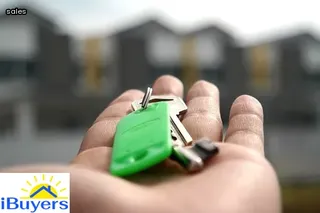When it comes to signing a contract for buying or selling a home, it is important to be aware of the warning signs that could indicate you are being scammed. If the seller or buyer is asking for payment up front, this is a major red flag.
Additionally, if they are trying to push you into signing documents without giving you time to read them over or have them reviewed by an attorney, that should also raise suspicions. The best way to protect yourself against potential scams when buying or selling a home is to trust your intuition and do your research.
Make sure you have all of the facts before making any kind of financial commitment and always make sure you're working with someone who is reputable and trustworthy.

When buying or selling a home, it is important to be aware of potential real estate fraud. As a buyer or seller, it is essential to do your research and take steps to prevent yourself from being scammed.
Some common signs of real estate fraud include sellers not providing necessary documents, buyers asking for personal financial information, and discrepancies between the sales contract and the deed. It is important to thoroughly review all paperwork before signing anything and to check for any suspicious activity related to the transaction.
Additionally, it is wise to work with reputable real estate agents who have knowledge of local laws and regulations so that you can ensure you are protected in any home buying or selling situation. Be sure to communicate openly with the other party involved in the transaction and document all conversations as well as any agreements made so that everyone involved is on the same page.
Finally, trust your gut; if something seems too good to be true, it probably is.
When it comes to buying or selling a home, it is important to be aware of the potential for scams. In particular, “We Buy Homes” scams are known to take advantage of home buyers and sellers by offering quick cash while fraudulently taking title to their homes.
It is essential for buyers and sellers to recognize the warning signs of this type of scam so they can protect themselves from falling victim. Home buyers should be wary of any “We Buy Homes” companies that require an upfront fee or offer overly generous offers that sound too good to be true.
It is also important to thoroughly research any company before agreeing to a sale, as well as make sure they have all the proper licenses and permits required in your area. Sellers should never sign over the deed to their property until everything has been properly filed with their local government office, including any taxes or liens associated with the property.
Additionally, sellers should always use a reputable real estate agent or lawyer when selling a home; this will help ensure the transaction is legal and legitimate. Finally, both buyers and sellers should always consult an attorney if they have any questions or concerns before entering into an agreement.

Navigating lock-out agreements and processing fees can be tricky when it comes to home buying and selling. It is important to understand the various elements of these contracts in order to avoid being scammed as a buyer or seller.
Lock-out agreements are contracts that protect the seller from buyers who back out of negotiations, while processing fees are generally associated with mortgage brokers. As a buyer, it is important to research the terms of a lock-out agreement thoroughly before signing anything; if there are any ambiguities, seek legal advice immediately.
It is also wise to carefully review all processing fees charged by a loan officer or broker during the transaction process. Being mindful of potential scams and understanding all contractual details can help you protect yourself as a homebuyer or seller.
When it comes to buying or selling a home, understanding cashier’s checks and refunds is essential. A cashier’s check is a type of payment that can only be issued by a financial institution such as a bank, and the check holder must have the funds available in their account before it can be issued.
It provides additional protection since it is backed by the bank and not by the individual who wrote the check. On the other hand, if you are paying with a refundable deposit, you will need to understand how it works and what your rights are as a buyer or seller.
Generally, when you make a refundable deposit on an item such as a house, you are entitled to receive back your money if certain conditions aren't met. As long as you know exactly what you are signing up for before making any payments, you can protect yourself from potential scams involving cashier’s checks or refunds.

When engaging in any type of real estate transaction, it is important to understand the legal implications and protections afforded by a Notice of Pendency. A Notice of Pendency, also known as a lis pendens, informs potential buyers that there is an existing claim or lawsuit involving the property they are interested in purchasing.
This document serves as a warning to buyers that the property may not be free and clear of any claims or liens, and should encourage them to thoroughly investigate the situation before closing on the purchase. Additionally, sellers should be aware that such a document may have an impact on their ability to sell the home, as potential buyers may become wary when faced with such a notice.
As such, it is important for both buyers and sellers to understand what exactly constitutes a Notice of Pendency, how it impacts their rights as either party in a real estate transaction and what steps can be taken to protect themselves from unexpected legal issues down the road.
Staying vigilant against unsolicited buyers offering off-market sales is a key part of avoiding home buyer scams. It's essential to be aware of who you're dealing with and always ask for an official contract, even if the offer seems too good to be true.
You should also research the property in question before signing any papers or making payments. It's also a good idea to get a second opinion from someone you trust, even if it's just asking a friend or family member for their opinion.
Furthermore, you should never feel pressured into signing anything without having all the facts in front of you first. If an offer looks suspicious, then it's best to walk away and look elsewhere.
The more research and due diligence done ahead of time, the better chance you have of avoiding getting scammed when buying or selling a home.

It is essential to protect yourself against forged deeds when buying or selling a home. The best way to do this is by verifying the identity of the individuals involved in the transaction, as well as the authenticity of all documents.
As a buyer, you should request copies of all documents related to the sale and check that they are properly signed and notarized. As a seller, it is important to ensure that all paperwork is properly filled out and that any payments you receive are from legitimate sources.
Additionally, you should always double check with local authorities about any changes in ownership and make sure to get a copy of the deed for your records. Finally, both buyers and sellers should never accept cash payments without proper documentation.
By taking these steps, you can safeguard yourself against fraudulent activities and protect your interests as a homeowner.
In some cases, a buyer may have the option to sue a seller for not disclosing issues with the home. It is important to understand when it is appropriate and how to go about it.
In order to successfully sue a seller, a buyer must be able to prove that the seller was aware of certain problems or issues before they agreed on terms and that these issues were deliberately concealed from them. As such, buyers should always ask for an inspection before signing any contracts and should make sure all questions are answered.
If a seller does not provide full disclosure or fails to disclose any known issues, buyers can take legal action in order to protect themselves and seek compensation for any damages incurred due to these undisclosed problems. Furthermore, sellers should also take precautionary measures by ensuring they are properly disclosing all relevant information before agreeing on terms with their buyers in order to avoid any potential legal action.

Home buyer scams are becoming increasingly common, so it is important to be aware of the common tactics used and how to protect yourself as a seller or buyer. A popular scam involves sellers who offer homes at prices that seem too good to be true, as they often require buyers to wire money directly with no contract involved.
Another tactic often used is a fake lease-to-own agreement which requires an upfront payment from the buyer, but does not actually guarantee ownership of the property after the payments have been made. Additionally, some scammers pose as legitimate home buyers and will make offers on properties only to disappear after receiving earnest money from the seller.
To avoid these scams, buyers should always research any potential deals carefully before signing a contract and ensure that all paperwork is accurate and legal. Sellers should also exercise caution when accepting an offer and verify that all documents are valid before handing over any money.
Finally, both parties should always use reputable real estate agents in order to protect themselves from fraudulent activity.
When entering into a real estate deal, it's important to be aware of potential red flags which could indicate the presence of a scam. As a buyer or seller, you should look out for any signs that the other party may not be acting in good faith.
One common red flag is when the buyer or seller refuses to provide financial documentation or proof of identity. This could be an indication that the person is not who they claim to be, and that their motives are fraudulent.
Another warning sign is unrealistic terms such as an excessively low price or an unusually fast closing date. Additionally, buyers and sellers should watch out for requests to wire funds directly without going through escrow, as this can also be indicative of fraud.
It's also wise to look into any individual or company you're doing business with on sites such as the Better Business Bureau or Yelp to make sure there isn't any history of past scams associated with them before entering into a real estate agreement. By being aware of these red flags and taking steps to protect yourself, you can avoid becoming a victim of home buying scams and make sure your interests are secure in any real estate transaction.

It is important to protect yourself from predatory lending practices when considering buying or selling a home. The most effective way to do this is to research and become familiar with the different types of scams that may exist in the market.
Common scams include loan flipping, equity skimming, and property flipping. Loan flipping involves convincing a borrower to refinance their loan multiple times and extract fees each time.
Equity skimming involves taking out a loan against the equity of a home without informing the owner of its terms or conditions, while property flipping occurs when someone purchases a distressed property, quickly resells it at an inflated price before any repairs are made, and leaves the buyer with an expensive fixer-upper. To protect yourself from these predatory practices, be sure to review all documents carefully before signing them; never take out loans when you don’t understand the terms; seek independent advice from a financial advisor if needed; and keep all records of your transactions for future reference.
Additionally, meet with real estate professionals who have experience in dealing with potential scams and can provide guidance on how best to proceed in your situation. By following these simple steps, you can help ensure that you are protected from any fraudulent activities that may arise during the home buying or selling process.
When it comes to reporting home buying scams, the most important thing to remember is to act quickly and gather as much information as possible. Start by making a note of any suspicious transactions and details about who was involved.
This includes their name, contact information, documents involved in the transaction, and a detailed description of what happened. When you have all this info, contact your local police department or consumer protection agency to report the incident.
You may also want to reach out to an attorney for advice on how best to proceed with your case. Additionally, make sure you keep documents related to the transaction safe in case you need them as evidence in court.
Home buying can be a complicated process so it's important that you stay vigilant and protect yourself from being taken advantage of.

Finding a legitimate real estate agent or company is essential for avoiding home buyer scams and protecting yourself as a seller or buyer. A good place to start is by obtaining referrals from friends, family, or colleagues who have had a positive experience in the past.
You can also check online for customer reviews of local agents and companies. Researching their credentials and certifications should be part of the process too.
Look for membership in professional associations, such as the National Association of Realtors (NAR). It's also important to ask whether they carry Errors & Omissions Insurance coverage that would protect you in case of any legal issues.
Finally, it's helpful to meet with them in person and discuss your needs to ensure that all parties are on the same page. Taking these steps will help you find an experienced, knowledgeable real estate agent or company that you can trust to handle your transaction.
Investigating a property thoroughly before moving forward with a sale is an essential step in avoiding home buyer scams and protecting yourself as a seller or buyer. Before signing any documents, buyers should ensure that all public records regarding the property are up to date and accurate.
Buyers should also take the time to inspect the property for potential issues, such as water damage or structural problems, that may require repairs or renovations. Home inspections are an important part of the process and should be done by a qualified inspector who can provide detailed reports on any issues that could affect the value of the house.
Additionally, sellers should consider obtaining a professional appraisal of their property to assess its current market value. This will help protect them from being taken advantage of by buyers who may try to lowball offers.
Finally, both parties should discuss who will be responsible for paying closing costs before entering into any legally binding agreements. Understanding these costs upfront can avoid any costly surprises down the line.

Before signing any contract, it is important to thoroughly evaluate all terms in order to protect yourself from home buyer scams. As a buyer or seller, it is essential to know exactly what you are agreeing to and that all information is accurate.
Make sure you read through the entire document and understand each clause before signing. It's wise to take time to review key points such as closing costs, financing arrangements, payment plans, occupancy rights, disclosure statements, warranties, deed restrictions and more.
If there are any questions or concerns about any of the terms listed in the contract, be sure to ask your real estate agent or lawyer for clarification prior to signing. By educating yourself on the different provisions of a home purchase contract and carefully evaluating each term before signing anything, you can make sure your interests are protected when buying or selling a home.
It is important to understand your rights as a home buyer in order to avoid scams and protect yourself during the purchase process. The first thing to consider is whether you are buying through a licensed real estate agent or an unlicensed individual.
Licensed agents are obligated by law to act in their clients' best interests, so it is important to make sure that any agent you use is properly licensed. Additionally, research the market before making a purchase; familiarizing yourself with market trends and comparable properties will help you know if you're getting a fair deal.
Finally, be aware of your legal rights surrounding disclosure of issues with the property; make sure all defects are disclosed prior to signing any contracts or making payments. By understanding your rights as a homebuyer, you can protect yourself from potential scams and ensure that both the buyer and seller get what they need from the transaction.

It is important for sellers and buyers to be aware of the potential for scams during the home buying process. It is essential to follow strategies for responding to suspicious activity that can protect both parties involved in the transaction.
Researching any individuals or companies involved in the sale, such as attorneys, real estate agents, or mortgage brokers, can help to ensure their legitimacy and reduce the risk of being scammed. Additionally, avoiding wiring large sums of money or signing blank paperwork until all documents have been thoroughly reviewed can prevent fraudulent activities from taking place.
Being aware of red flags throughout the transaction process is another way to protect yourself; these include requests for personal information, large deposits prior to viewing a property, and unrealistic offers. Working with a reputable real estate lawyer who has experience handling similar transactions can also provide an extra layer of security.
In conclusion, staying alert and taking proactive measures can help buyers and sellers avoid home buyer scams and protect themselves from becoming victims.
Law enforcement plays a major role in combating real estate fraud, as they are responsible for investigating and prosecuting perpetrators of scams. The FBI and the Department of Justice (DOJ) work together to identify fraudulent activities and bring justice to those who have been wronged.
Additionally, state and local law enforcement agencies may be involved in investigations of real estate fraud, especially when it involves buyers or sellers in that particular jurisdiction. It is important for individuals to understand their rights under the law should they become victims of a home buying scam.
Consumers may also file complaints with state consumer protection offices if they feel that their rights have been violated, and seek legal advice from an attorney if necessary. In some cases, consumers may even be able to receive monetary damages from the perpetrator as part of the civil remedies available under the law.
Furthermore, victims can report any suspicious activities to the Federal Trade Commission (FTC). While these legal options are not always an immediate solution to a problem, taking action against fraudulent actors can help protect others from experiencing similar issues in the future.
House buying scams are a common occurrence in the real estate market. Unfortunately, these scams can be expensive for both buyers and sellers.
These scams typically involve a fraudulent individual or group who takes advantage of an unsuspecting buyer or seller by misrepresenting information about the house or its value. Common tactics used by scammers include falsifying documents, promising unrealistic financial gains, and using high-pressure sales tactics to rush a deal.
In some cases, buyers may also be asked to pay upfront fees without receiving any services in return. To protect yourself from becoming a victim of home buying scams, it's important to always research the property thoroughly before signing any contracts or agreements.
Additionally, never take another party's word as gospel and always verify their credentials and references with reliable sources such as banks and government agencies. Lastly, never provide personal information such as bank accounts or social security numbers to anyone you don't trust completely and make sure to read all documents carefully before signing them.
By taking these precautionary measures, buyers and sellers alike can avoid becoming victims of real estate frauds.

When considering a home sale or purchase, it is important to be aware that home buyer scams exist and take necessary precautions to protect yourself.
Knowing how to recognize signs of a potential scam can help you avoid being taken advantage of in the process.
Signs that someone may be attempting to scam you in a home sale or purchase include requests for large amounts of money up front, unrealistic promises of quick returns on investment, offers that seem too good to be true, requests for personal information such as bank account numbers, social security numbers and credit card details, insistence on using wire transfers rather than escrow services or checks, and communication via email only.
If you encounter any suspicious behavior when buying or selling a home, it is best to walk away from the transaction and seek professional advice from an experienced real estate attorney.
When it comes to buying or selling a home, one of the most important things to remember is to be wary of potential scams. Fake buyers can be hard to spot, but there are certain red flags that you should be aware of when interacting with strangers who may be trying to scam you out of your money. Before entering into any real estate transaction, look out for the following signs that could indicate a fake buyer:
They make an offer without viewing the property. A genuine buyer will always want to take a tour of the home they are interested in before making an offer or submitting payment.
They're offering more than fair market value. Fake buyers may try and lure unsuspecting sellers by presenting them with offers that seem too good to be true, such as agreeing to pay above asking price or including additional services or goods in the deal.
They ask you to wire money instead of using other payment methods. Any form of wiring money is a huge red flag since the funds cannot be tracked and will not show up in your bank account immediately if it’s fraudulent.
They are unwilling to provide proof of identity or financial documents such as bank statements and credit reports before going through with the purchase. Genuine buyers will usually have no problem sharing these types of documents as part of their due diligence process when buying a home.
They're unable or unwilling to meet in person for closing procedures and paperwork signings even after viewing the property and making an offer on it. It's important for both parties involved in a real estate transaction to meet in person at some point during the process, especially when it comes time for signing final documents and closing procedures at the end of escrow period so everyone can ensure all information is accurate and correct before proceeding with exchange funds between both parties involved in this transaction agreement legally binding contractually obligated obligations between both parties involved so please protect yourself from potential scammers by being mindful of these warning signs mentioned above along with proper research consulting with local legal counsel before entering into any type real estate transaction agreement legally binding contractually obligated obligations between both parties involved .
A: Common home buyer scams include fake real estate listings, overcharging for repairs, and title fraud.
A: It is important to research the market, hire a real estate lawyer, check the seller’s background, and get a home inspection to protect yourself from home buyer scams.

A: Home buyers should be aware of any red flags that may indicate a potential scam. Examples can include requests for large upfront payments, requests for personal information, or promises made that seem too good to be true.
A: Home buyers should research the property, check the seller’s credentials, get a home inspection, and verify financing options in order to ensure they are making a safe, informed purchase and avoiding potential scams.